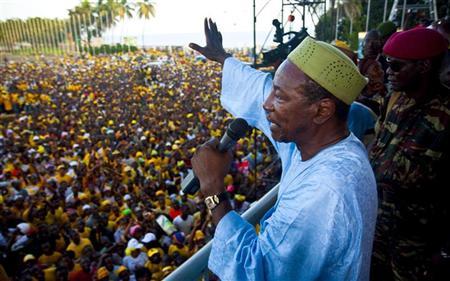Mali: Why the Hardest Part is Yet to Come – By Imad Mesdoua


UN Secretary General Ban Ki Moon meets Mali's interim President Dioncounda Traoré(UN photo library).
Retaking the north was the easy part. Now Mali faces guerrilla attacks, reportedly increasing cooperation between rebel groups, ‘the Tuareg problem’, and a divided government.
Early on during the French intervention which began in January 2013, many journalists in the international press were quick to note that Islamist militants had just “melted away” into the vast desert regions of northern Mali. As French jets attacked key strongholds, hundreds of Islamist fighters prepared convoys, which would escort leaders, weapons and fighters away from major towns.
Eye witness accounts confirmed suspicions that the militants’ departure was “orderly” and well-prepared. Their planned withdrawal may indicate their clear intention to redefine the nature of the conflict in Mali on their terms. Indeed, in a document allegedly left behind by al-Qaeda in the Islamic Maghreb (AQIM) in Timbuktu, a senior commander admits that an international intervention would exceed the group’s capability and that they ought therefore to retreat to their “rear bases” for the time being.
Recent events have also shown that local and international troops should prepare for increased resistance and a protracted campaign. Malian soldiers faced the first wave of attacks when various suicide bombers targeted Malian army bases and checkpoints in the city of Gao. A day later, two militants (one Arab and one Tuareg) were intercepted with explosive belts strapped to their bodies. Malian troops were also tested by a significant counter offensive led by the Movement for Oneness and Jihad in West Africa (MUJAO) in the same city on 10 February.
As Mali’s northern provinces become more secure, Islamist militants will increasingly engage in targeted attacks, using asymmetric warfare to test international troops and regain the upper hand. The caves and mountains of the Adrar des Ifoghas region, for example, are ideal locations for militant groups to hide and prepare hit and run operations.
Another worrying development in recent weeks has been allegedly increasing cooperation between Islamist militant groups across West Africa. Locals in Timbuktu claim Nigeria’s rebel group Boko Haram had training camps in the city. A flyer from another Nigerian militant group, Ansaru, was apparently discovered in Gao in the abandoned home of Mokhtar Belmokhtar, the leader of the group believed to be behind the In Amenas attack on a gas plant facility in Algeria. And further suggestions have been made that Boko Haram militants might be using Chad as a rear base to prepare attacks. Chad has sent 1,800 men to fight alongside French and African troops in Mali.
Chad and other fragile states across the Sahel will struggle to police their highly porous borders as heavily armed gunmen move freely across them. The threat Islamic militancy poses to regional stability and beyond cannot be overstated. Mali’s neighbours face a direct threat from militants spilling over. Niger, for example, has agreed to allow the US to deploy drones from its airspace to help police its vast desert regions.
With over 4,000 French ground troops stationed in Mali, the number and size of their base camps growing by the day, and a deteriorating security climate, French forces are unlikely to fully withdraw from the region any time soon.
The deteriorating security climate will have an important effect on Western companies operating there. The tragic hostage crisis in In Amenas prompted security audits among Western companies throughout the region. Policymakers are already urging firms to assess, review and rethink security at their facilities in order to adapt to the mobile nature of these militant groups. French Special Forces have already begun securing vital uranium mines in Niger.
Back in Bamako, the alleged alliances developed over the years between the political elite, smugglers and drug dealers greatly undermined the country’s stability and development. More importantly, Mali and other states in the region will have to address seriously what some are now calling “˜the Tuareg problem’. This will require dialogue and political will to curb marginalisation and stigmatisation from which they and other minority ethnic groups suffer throughout the Sahel.
But divisions at the highest levels of the Malian state hinder Bamako’s ability to adequately address the concerns of Tuareg groups in the north. More recently, differences between pro- and anti-coup factions within the army led to outright clashes in Bamako. The Malian army has also used the French intervention to issue arrest warrants against Tuareg leaders and brush aside their demands. Malian troops are believed to have actively participated in reprisals against local Tuareg and Arab populations in the north. This behaviour, if it is not curbed, will only stoke the flames of ethnic tension.
Mali’s challenges require a multi-dimensional approach, which looks beyond simplistic interventionist agendas. The real roots of the current crisis have been overshadowed by the dominant “war on terror” narrative presented in the media. Beyond the restoration of order and some form of stability, Mali requires responsible and legitimate leadership capable of negotiating long term political solutions. The interim civilian government in Bamako alongside civil society and international actors should use the brief respite afforded to it by the presence of foreign troops to address the endemic corruption and legitimate grievances, which lie at the roots of this multifaceted crisis.
Imad Mesdoua is a political analyst specialising in the Middle East and North Africa. He currently works for Pasco Risk Management.





